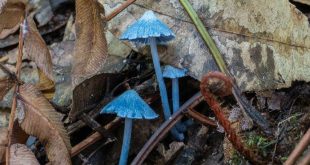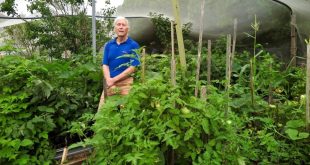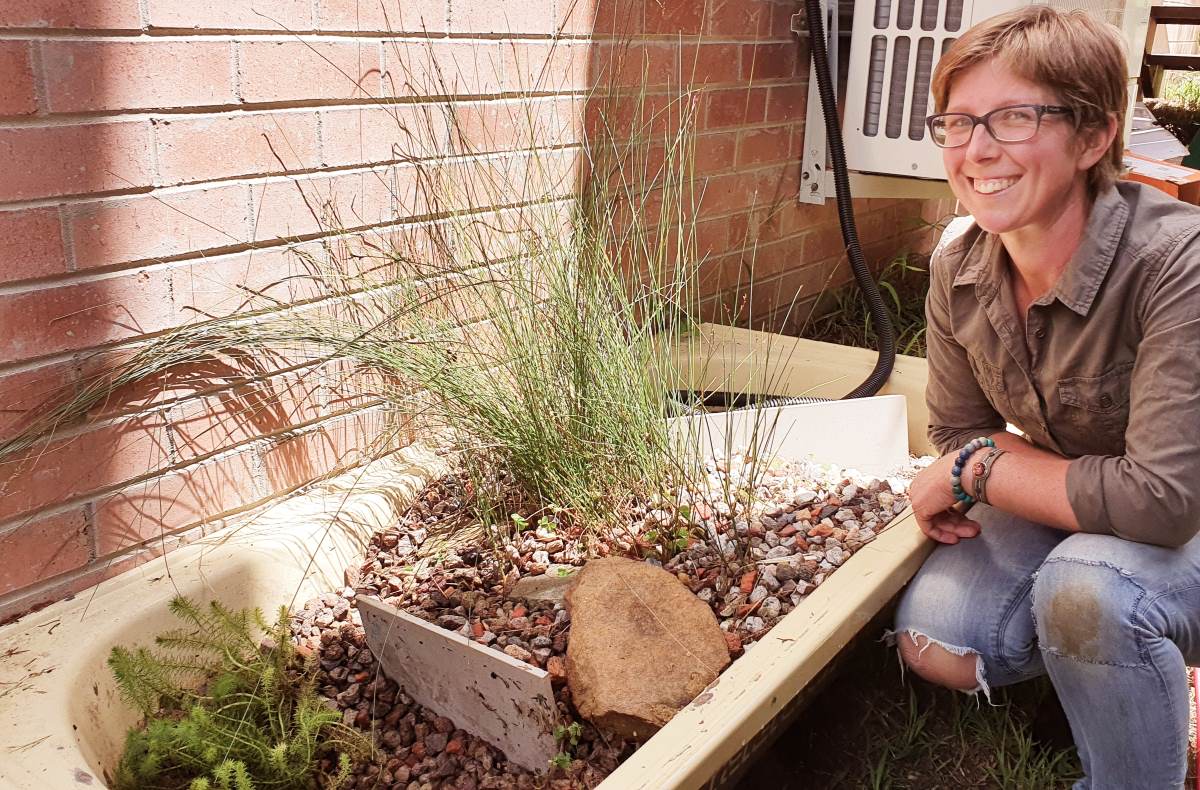
Leni Nyssen of Alchemy Farms with her simple reed bed filtering system.
Story and photos by Linda Moon
Setting up a basic system for recycling grey water is cheap, easy and worthwhile. Read about a garden in North Leura and learn from a permaculture designer how it can be done.
Key Points:
- Save money and time watering, reduce water waste and hydrate your garden by reusing grey water.
- A local permaculture designer explains how she created a simple setup.
- Learn the local rules and regulations around using grey water.
“We want to grow a lot of food, and we have kids and do a lot of washing, so what better way to use that water than out to the garden.” Leni Nyssen of Alchemy Farms Permaculture Design is showing off her basic grey water filtering system: a simple version of a ‘reed bed system’ which actually looks easy to set up.
The permaculture consultant and educator’s backyard (in North Leura) is littered with sprawling veggie patches and kids’ toys, a rambling dog and chickens. The message: you don’t have to be wealthy, a plumber, living on acreage or even a homeowner to re-use your grey water.
What is grey water?
It’s the wastewater from our bathrooms and laundries. With relatively less chemicals, fats and biological matter than dark grey water (from the kitchen) or black water from toilets, it’s the recycling go-to of wastewater.
By re-using her washing machine water, Leni reckons her system waters most of the garden for her. The family’s washing machine uses an estimated 80 to 100 litres per load.
Leni’s reed bed system
From the washing machine hose, plastic piping dangles downstairs into an old bathtub at the side of the house. Gravity (Leni’s washing machine is on the second floor) propels the water forward.
The bath contains stones, gravel, sand, reeds and other water loving plants. Based on the concept of wetlands, these are partitioned into a series of sections, including a mini pond area, that slows the water flow, filtering and cleansing it. Having a smaller outlet than inlet, also helps stem the flow, Leni explains. The whole process takes about 20 minutes.
There’s no odour. “It’s only when there’s storage and bacteria starts to get active, that it starts to smell,” she explains.
The grey water is fed to the garden via outlet hosing attached to the bottom of the bath. As the garden slopes gently downhill, there’s no need for a pump. Too easy!
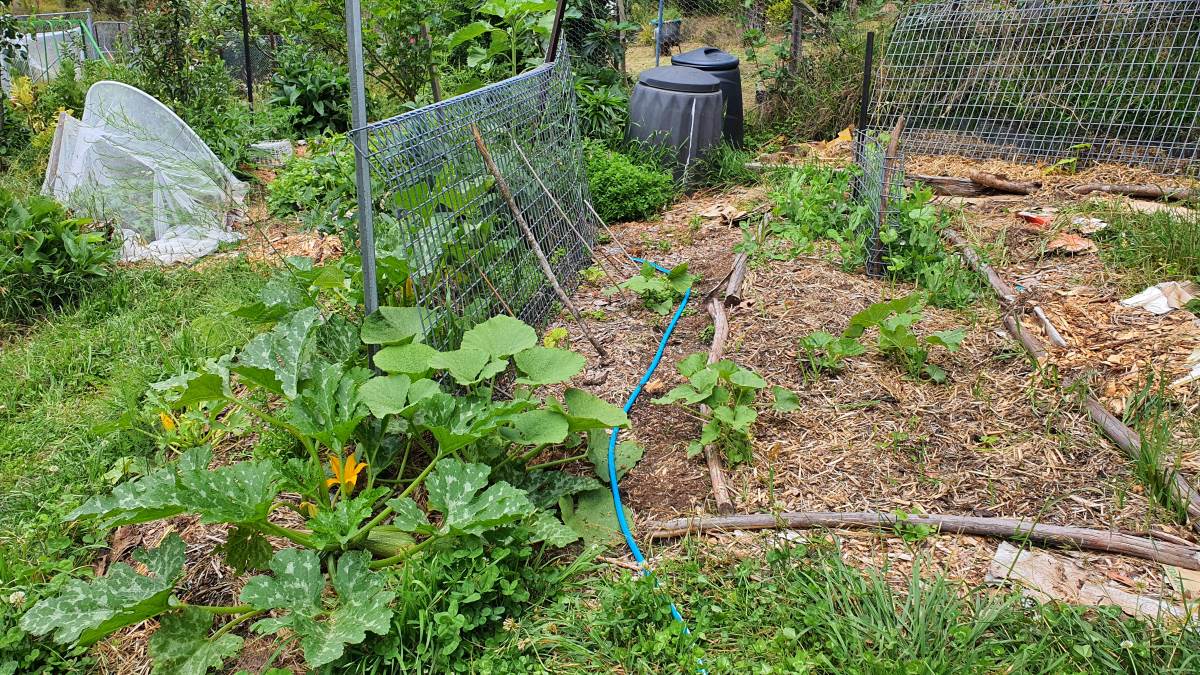
The grey water is fed into deep mulch-covered swales (trenches) in the food forest area to help grow fruit trees, vines and perennials.
Is grey water okay for the garden?
Leni, who studied permaculture design and education with Geoff Lawton and Rowe Morrow, views grey water recycling as another helpful method for improving soil moisture and the resilience of our gardens to dry conditions. She says, “the real focus in permaculture is slowing water and spreading it and soaking it into the landscape.”
“Living in such a fire-prone area, we need to focus on making sure the landscape is hydrated” – Leni Nyssen.
The main issue with grey water is sodium, which in turn affects soil pH. Grey water from the washing machine (laundry products tend to be high in sodium) usually makes soil more alkaline. Phosphates, oils and chemicals are other common problems in grey water.
For the laundry, Leni recommends soap nuts (which you can get from the Blue Mountains Food Co-op), or pure soap flakes. “That has the least impact when it goes out to the soil,” she says. “The main thing is it [grey water] should go to the root systems rather than leaves that you’re going to pick and eat.”
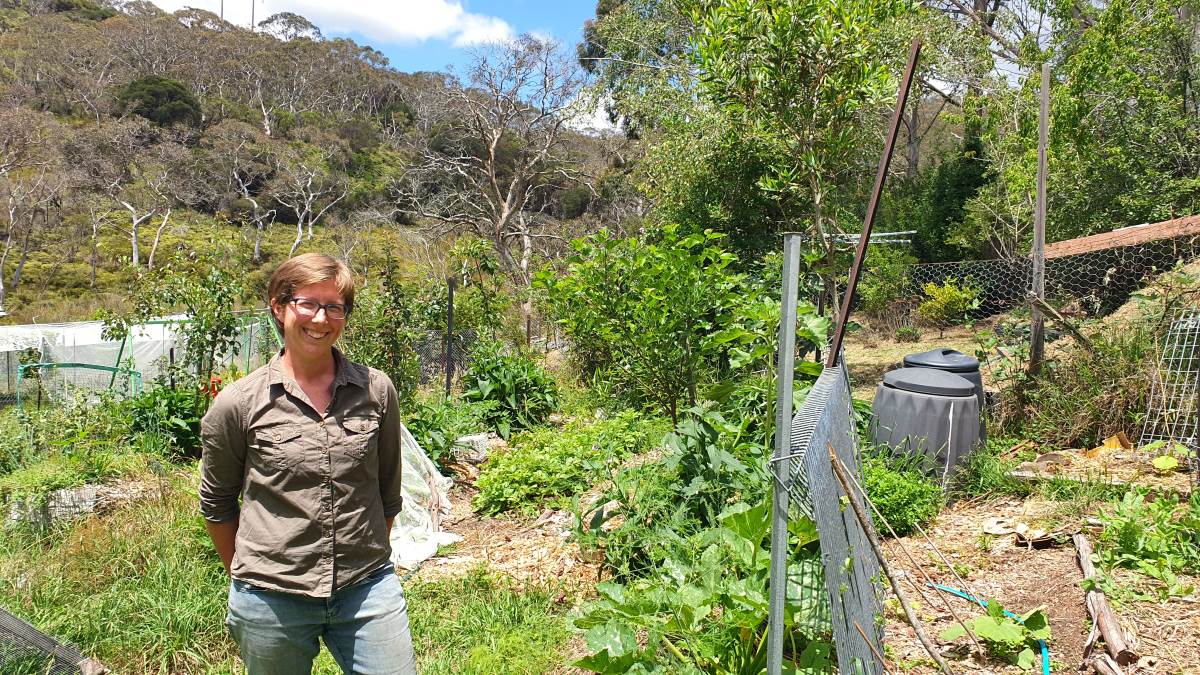
Leni Nyssen’s permaculture garden gains the advantage of extra hydration from grey water over summer.
More options for using grey water
A reed bed bath system isn’t your only option.
- Buckets: Catch water in the shower, bath or basin or the rinse cycle of the washing machine.
- Water diversion devices: Inexpensive and can be installed by a plumber. Alternatively, use a grey water diversion hose attached to your washing machine. Bathroom or laundry water can be diverted into your land (such as trenches, swales and basins around trees) but should be cooled in a holding trench or other collection point first.
- More expensive and complex domestic waste water treatment and storage systems with pumps, filters and more.
Note: with any drip irrigation or ag-piping containing holes, filters are a must to avoid them getting clogged with lint, hair and other stuff.
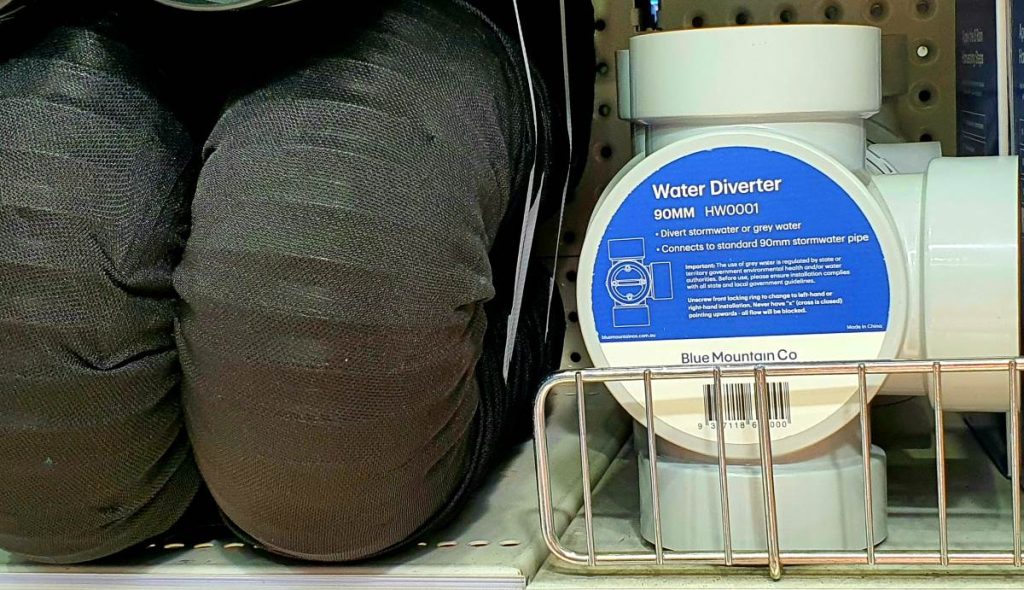
A grey water diverter for sale at a local hardware shop is an inexpensive option.
Wise and safe grey water use
Also check out these tips from the experts:
- Use the most eco-friendly, low-sodium, low-phosphate laundry and personal care products possible.
- Don’t use water after dyeing your hair, cleaning the bath, basin and so on. Bleaches, drain cleaners, disinfectants, hair dyes, shampoos, toothpaste, mouthwash, perfumes and many other products contain chemicals and other ingredients harmful to soil health (and possibly to you too!).
- Don’t use grey water on vegetables, herbs and root veg.
- Don’t store untreated grey water for longer than 24 hours to prevent bacteria build-up.
- Distribute grey water to the subsurface. Don’t let it pool on the surface: a recipe for bacterial or algal bloom.
- Don’t use water from washing nappies.
- Regularly monitor and maintain any reed beds for bacteria and algae.
- Never use hot water directly on the garden. It will kill beneficial soil organisms.
- Don’t let pets or wildlife drink grey water or let kids play in it.
- Give your garden regular breaks from grey water.
- Monitor soil health and pH. Regularly add organic matter to soil.
- Avoid watering acid-loving plants, like berries, camellias and rhododendrons, with grey water.
- Try “hydro zoning” your garden according to water needs. Position plants with similar water needs together. Direct grey water to the most thirsty.
Know the rules
You don’t need council approval to re-use grey water on your land, but you do have to abide by certain rules around its use. These include only using it to irrigate the sub-surface of your garden using pipes / hose 100mm below the ground and avoiding using it during rainy periods and if someone at home has a contagious disease. Purple hoses and fittings should ideally be used to identify grey water recycling.
For more rules and restrictions around local grey water use, check out the Blue Mountains City Council Waste Water Management / Grey water page.
Take Action:
Share this article:
This story has been produced as part of a Bioregional Collaboration for Planetary Health and is supported by the Disaster Risk Reduction Fund (DRRF). The DRRF is jointly funded by the Australian and New South Wales governments.
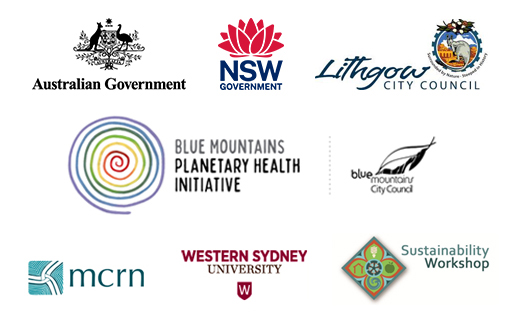
More from around the region
Find out how you can join our team of writers and videographers next Saturday 25 May! Our stories drive and transform our culture. Over the last 15 months we’ve hired staff, run workshops and mentoring programs for aspiring writers and videographers, and welcomed volunteers to our team, so we can find and share the solutions we need. If, as communities, we work together to support one another and to share better ways of doing things, future extreme weather events are less likely to become disasters and we’ll have the capacity to do what needs to be done to restore the health of our planet so that all life can flourish. Would you like to join our fabulous and growing team! Next Saturday evening at 7pm we’re launching the Planetary Health Writers’ Network, following a workshop with award-winning writer Sophie Cousins from 2-5pm. Join us! All ages welcome. Registration essential for the workshop here (link in profile): https://bit.ly/3V6kQke and for the Writers’ Network here (link in profile): https://bit.ly/4dLOthL
Both events are free thanks to funding from Disaster Risk Reduction Fund (DRRF). The DRRF is jointly funded by the Australian and New South Wales governments.
#changethestory #solutionsmedia #togetherwecan #writers #videographers #creativesforclimate #planetaryhealth #katoomba #bluemountains #collaboration #writersnetwork
In April 2021 Blue Mountains City Council became the first Council and government entity in Australia to commit to integrating Rights of Nature (RON) principles into its operations and practices. Yesterday we were thrilled to be able to spend a few hours with Susie Talbot, an Australian lawyer, based in the UK, who was visiting on a Churchill Fellowship to explore the implementation of Rights of Nature in different parts of the world. It was inspiring to hear how she has spent decades using the law to achieve transformative change in relation to complex socio-economic and environmental challenges. In 2020, she founded the Anima Mundi Law Initiative to strengthen the intersections between human rights and ecology, and to encourage the practice of law in alignment with planetary realities and collective consciousness. Projects include the creation of a ‘Rights of Nature Toolkit’ and we look forward to working with her into the future. You can read more at her website: https://www.animamundilaw.org/
Photo: Susie Talbot standing in front of Scott Marr`s artwork in the Planetary Health Exhibition space.
#rightsofnature #earthjurisprudence #anewlegalstoryforanecologicalage #ecologicalage #churchillfellowship @churchillfellowship #animamundi #humanrights #ecology #planetaryhealth
Nelson Mandela once said “Education is the most powerful weapon which you can use to change the world”; and William Butler Yeats, the great poet, said “Education is not the filling of a pail but the lighting of a fire.” If you’re a teacher, educator or involved in education in some way in the Blue Mountains the staff of the Blue Mountains Planetary Health Initiative would love to meet you next Monday 20th May when we join the Blue Mountains Sustainable Schools Network to see how we can all join forces to urgently accelerate the change we need to restore the health of our planet. 3.30-5.30 at Faulconbridge Public School. RSVP Beth Healy DirtMum (details in poster)
#sustainableschoolsnetwork #collaboration #planetaryhealth #environmentaleducators #artteachers #englishteachers #musicteachers #allteachers
Hans and Tillie Coster have brought a Tolkien fantasy to life, building an underground Hobbit Hall at their property ‘Middle Earth’ in the Kanimbla Valley. They`ve come very close to self-sufficiency, storing their solar power in banks of nickel-iron batteries, and building underground has meant they`re more able to withstand extreme weather events. They`ve also reforested degraded country, planting over 3000 trees! Read more in Lithgow Area Local News (link in profile):
https://lithgowlocalnews.com/middle-earth-kanimbla-valley/
#middleearth #hobbiton #hobbithall #kanimblavalley #selfsufficient #offgrid #nickeliron #solarbatteries #nickelironbatteries #reforestation #undergroundhouse #compostingtoilet #disasterriskreduction #planetaryhealth
There are only about 750 Dwarf Mountain Pine plants left in the wild, according to the latest survey. The survivors are limited to waterfall spray and seepage zones in the southern escarpment between Katoomba and Wentworth Falls, but renewed efforts to save it in light of its potential upgrade to ‘critically endangered’ status are giving greater recognition to a rare and unusual prehistoric native in our midst. Read more in Katoomba Area Local News (link in profile)
https://www.katoombalocalnews.com/saving-the-dwarf-mountain-pine/
#dwarfmountainpine #criticallyendangeredspecies #prehistoricnative #biodiversity #collaboration #whatwecando #katoomba #wentworthfalls #bluemountains #planetaryhealth
Our Planetary Health newsletter is now out, sharing inspiring stories from the Lower Mountains to Lithgow: Read it here and subscribe via any of the Local News sites: https://bit.ly/3QKevs6 (link in profile)
Katoomba Area Local News: Living on the Ledge: Saving the Dwarf Mountain Pine
Lithgow Local News: How a Tolkien Fantasy Turned Into Off-grid Reality at Middle-Earth in the Kanimbla Valley
Blackheath Area Local News: Inspirational, Intergenerational Play in Blackheath
Lower Mountains Local News: The Positive Social Impact of the Glenbrook Country Women’s Association
Mid Mountains Local News: Stronger Together: Mid Mountains Neighbourhood Centre Walks the Talk
Springwood Area Local News: People Of Binfluence: The 2024 Binfluencer Awards
#solutionsmedia #hyperlocalnews #planetaryhealth #localstories #inspiration #bluemountains #lithgow
Woohoo we just hit 1 MILLION views on our reel about Physicist Hans Coster and why he`s using nickel-iron batteries.
You can now read the full story and watch a video about him and his wife Tillie at their property Middle Earth (links in profile). We`d love you to subscribe to our Blue Mountains Planetary Health YouTube channel and share the latest video on him there as well.
The video is fabulous:
https://www.youtube.com/watch?v=3kqAczIRzqk&t=17s
#offgrid #underground #nickelironbatteries #planetaryhealth #reforestation #selfsufficient #middleearth #bagshotrow
A small group of Blue Mountains women is helping local women survive and thrive and also contributing to improve maternal and newborn survival in developing countries. Assembling birthing kits for women in remote locations is just one of the many ways the @zontaclubbluemountains is empowering and supporting women, both abroad and at home. Read more in Lower Mountains Local News (link in profile)
https://lowermtnslocalnews.com/zonta-blue-mountains/
#womensupportingwomen #maternalhealth #birthingkits #zontainternational #zonta #abetterworldforwomen #localaction #localactionglobalimpact #planetaryhealth
We are thrilled to announce that award-winning health writer and author Sophie Cousins will be leading the workshop: Our Community, Our Stories: Writing for Change from 2-5pm on Saturday 25 May at the Planetary Health Precinct. Sophie`s work has been published in the New York Times, London Review of Books, the Guardian, the Lancet, Meanjin and others. She also works as a public health consultant for the World Health Organisation. The workshop will be followed at 7pm by the launch of the Planetary Health Writers Network. Places are limited so bookings essential (link in profile): https://www.eventbrite.com.au/e/our-community-our-stories-writing-for-change-tickets-895548458547
#writingforchange #impactfulstories #solutionsjournalism #writingworkshop #planetaryhealth #changethestory #thenewsweneed #writersnetwork #bluemountains #katoomba
We`re thrilled to welcome Tamsyn McGrouther to our growing team of volunteer storytellers. She`s reporting on how the Springwood Lot Party transformed an underused space, the car park at Springwood Train Station, into a vibrant community space with food stalls, art opportunities and live music. Read more in Springwood Area Local News (link in profile) : https://springwoodlocalnews.com/springwood-lot-party-2024/
#changethestory #hyperlocalmedia #solutionsmedia #springwood #inspiringstories #planetaryhealth #bluemountains #localnewsmatters
What do tea, samurai clans, William McArthur, Benjamin Franklin, Vietnam and the Botanic Gardens at Mount Tomah have in common? Read our story in Blackheath Area Local News to explore the way camellias and cultures are woven together and why it’s important we think about conserving biodiversity as a global project implemented at a local level. (link in profile) https://blackheathnews.com/camellias-at-blue-mountains-botanical-garden/
@botanicsydney #botanicgardens #mountomahbotanicgardens #camellias #camelliasinensis #tea #samurai #bluemountains #themounts #biodiversity #planetaryhealth
Mushrooms are a hot topic at the moment with more and more research illuminating the essential role these organisms play in the health of the planet as well as the significant health and medicinal benefits they hold for humans. Belle Butler visited local mushroom grower, Alex Felix, at his farm in Lawson to talk about the mighty mushroom. Read more in Mid Mountains Local News (link in profile)
https://www.midmtnslocalnews.com/earthrising-mushroom-farm/
#mushroomgrowkit #mushrooms #fungi #growyourown #lawson #bluemountains



